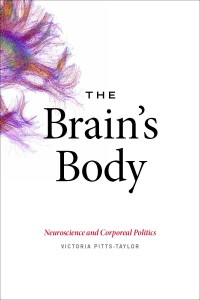 Victoria Pitts-Taylor‘s new book, The Brain’s Body: Neuroscience and Corporeal Politics, was published by Duke University Press in February 2016.
Victoria Pitts-Taylor‘s new book, The Brain’s Body: Neuroscience and Corporeal Politics, was published by Duke University Press in February 2016.
Pitts-Taylor ’93 (HTC Sociology) is Professor and Chair of Feminist, Gender & Sexuality Studies at Wesleyan University.
She studies the body and embodiment from sociological and cultural perspectives.
Her research and writing address how the body is understood and modified by medicine, science and culture.
Author of In the Flesh: the Cultural Politics of Body Modification (2003, Palgrave Macmillan) and Surgery Junkies: Wellness and Pathology in Cosmetic Culture (2007, Rutgers University Press), Victoria is also the Editor of the two-volume Cultural Encyclopedia of the Body (2008, Greenwood Press), and the forthcoming volume Mattering: Feminism, Science, and Materialism (NYU Press, 2016).

Victoria Pitts-Taylor
Pitts-Taylor is a past recipient of the American Sociological Association’s Advancement of the Discipline Award and a former co-editor of WSQ (Women’s Studies Quarterly).
She served as the first elected chair of the American Sociological Association’s Section on the Body and Embodiment.
Social Structures Shape Neuroscientific Knowledge
About The Brain’s Body: Neuroscience and Corporeal Politics:
In The Brain’s Body Victoria Pitts-Taylor brings feminist and critical theory to bear on new development in neuroscience to demonstrate how power and inequality are materially and symbolically entangled with neurobiological bodies. Pitts-Taylor is interested in how the brain interacts with and is impacted by social structures, especially in regard to race, class, gender, sexuality, and disability, as well as how those social structures shape neuroscientific knowledge. Pointing out that some brain scientists have not fully abandoned reductionist or determinist explanations of neurobiology, Pitts-Taylor moves beyond debates over nature and nurture to address the politics of plastic, biosocial brains. She highlights the potential of research into poverty’s effects on the brain to reinforce certain notions of poor subjects and to justify particular forms of governance, while her queer critique of kinship research demonstrates the limitations of hypotheses based on heteronormative assumptions. In her exploration of the embodied mind and the “embrained” body, Pitts-Taylor highlights the inextricability of nature and culture and shows why using feminist and queer thought is essential to understanding the biosociality of the brain.



















Comments